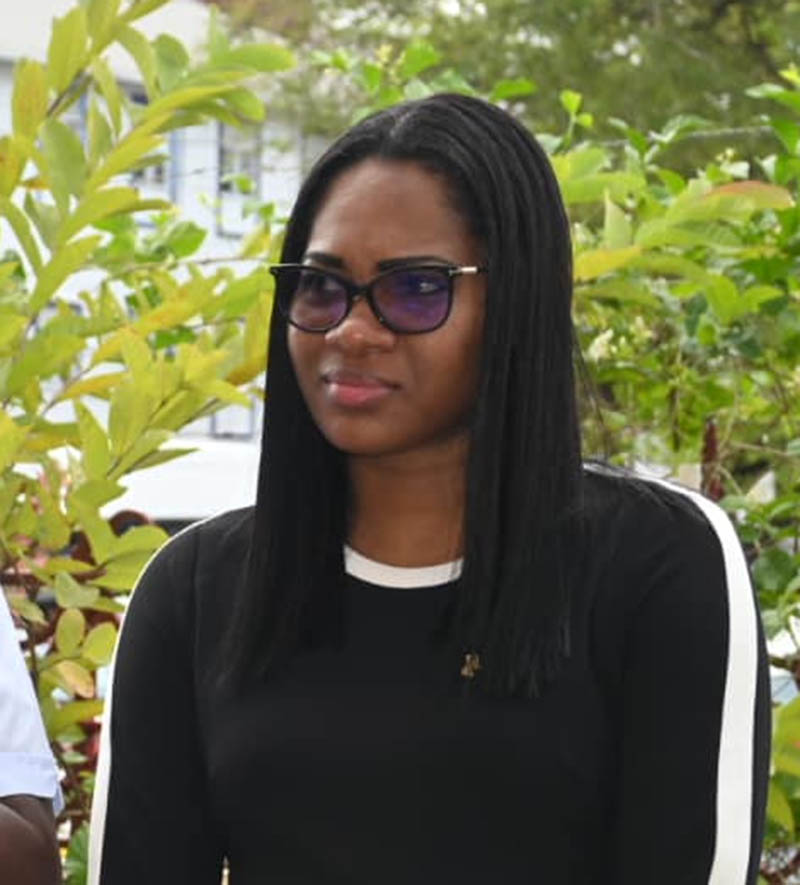The Ministry of Foreign Affairs yesterday sought an explanation from the United States Embassy here on why the mobile phone of Ministry of Home Affairs Permanent Secretary, Mae Toussaint Jr. Thomas was confiscated by authorities in the US while she was in transit to China.
Sources say that the embassy has responded and said that it had no specific information on the issue to share. It pointed the government to US Customs and Border Patrol (CPB) regulations, which provide for searches and confiscation of electronic equipment.
And since Thomas herself has not yet informed the Foreign Affairs Ministry of the incident in New York, the government is also awaiting a report from her before deciding on the way forward.
“We have requested a report from the United States authorities and we are awaiting that…we are also awaiting a report from the PS, as we received no report on what transpired. After that, we will be able to properly analyse for the way forward with further interactions with US authorities,” a senior Ministry of Foreign Affairs official told Stabroek News yesterday when contacted.
The confiscating of the phone would raise major concerns for the government as it would signal that CPB officials have questions as it relates to Thomas who became the Permanent Secretary in 2020 after the PPP/C entered office. The Ministry is the central focus for law and order and Thomas is the point person for engagement with a large number of international agencies and programmes such as citizen security.
Up to press time there was no official word from the government on the matter.
Several attempts to contact Minister of Home Affairs Robeson Benn for a response were futile for the second day in a row, as both calls and messages to his mobile number went unanswered.
A senior government official echoed the position of the Ministry of Foreign Affairs (MOFA) while noting the embassy’s response. On Thursday, Vice President Bharrat Jagdeo was asked about the matter and he said that he was unaware of it.
It was an article in yesterday’s Stabroek News which triggered the MOFA to seek answers from the US embassy, sources said.
In turn, the embassy replied that it didn’t “have any specific information to share” and pointed the ministry to information that country’s Department of Homeland and Security (DHS) shares with travelers, and CPB regulations. Noted was that travelers including US citizens and staff of the embassy are subject to the very regulations.
Those regulations include that, “If CBP officers at a port of entry need more information to determine your admissibility into the U.S., you may be directed to an interview area known as secondary inspection. You could also be subjected to a secondary inspection as a result of a random search. Anyone, including U.S. citizens, may be subject to secondary inspection if the CBP officer has reservations about admitting him or her.
“Secondary inspection is a more detailed inspection to determine admissibility. It allows CBP officers to conduct additional research to verify information without delaying other travelers. During a secondary inspection, the CBP officer may ask you detailed questions about your travel plans and immigration history. You may be asked to produce additional proof of identification and detailed information about the purpose of your visit to the U.S. Both you and your belongings may be subject to a thorough search. Such inspections may include a search of all electronic information stored on your laptop, cell phone or other electronic device,” it adds.
Sources said that Thomas will not return via the United States as she will fly from London, UK.
This newspaper was unable to ascertain if she travels with a Guyana diplomatic or service passport and in her transit what visa type she produced to CBP officers. However, regardless of passport type, no holder in the United States is subject to total immunity from searches and checks.
Government determines the passport type issued to persons who work for it, and senior government officials are most times issued diplomatic passports while high ranking civil servants obtain service passports.
For government business being conducted in the US, an A Visa -a category of non-immigrant visas allowing travel to the United States issued to ambassadors, diplomats, government officials, and their support staff – is provided. Depending on the status of the person, either that country’s A-1 or A-2 or A-3 visa is issued.
“To qualify for an A-1 or A-2 visa, you must be traveling to the United States on behalf of your national government to engage solely in official activities for that government. The specific duties or services that will be performed must be governmental in character or nature, as determined by the U.S. Department of State, in accordance with U.S. immigration laws. Government officials traveling to the United States to perform non-governmental functions of a commercial nature, or traveling as tourists, require the appropriate visas and do not qualify for A visas. The fact that there may be government interest or control in a given organization is not in itself the defining factor in determining if you qualify for an A visa,” the Department of State website states.
And for travel purposes not permitted under the A-1 and A-2 visas it is stated that, “Government officials coming to perform non-official or non-governmental functions of a commercial nature, or traveling as tourists, must apply for the appropriate visa category for the specific travel purpose, such as a B-2 visa for tourism…
“Local government officials representing their state, province, borough, or other local political entity require visitor (B) visas,” it added.






